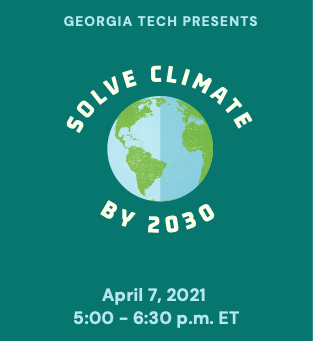
On April 7, 2021 the Climate and Energy Policy Lab (CEPL) hosted its second annual climate dialogue -- Solve Climate by 2030. Top climate scientists from around the world are in agreement: we have ten years to curb global warming and mitigate climate change under a 3 degree Celsius temperature rise. Solve Climate by 2030 is an international project started at Bard College to find local and state level solutions to carbon emissions and curb global warming by the year 2030.
The event focused on three key questions: What is needed to help achieve a green economic recovery and a just transition in Georgia? What is one or two specific policies or actions that the state, communities, or individuals can take? What are some possible bottlenecks that can hinder us from achieving these goals?
Georgia Tech's virtual webinar invited expert panelists to join a discussion on creating impactful, equitable solutions in the state of Georgia. Dr. Marilyn Brown, CEPL director, Regents Professor, and Brook Byers Professor of Sustainable Systems moderated the panel. Panelists included John Lanier, executive director of the Ray C. Anderson Foundation; Commissioner Tim Echols, vice chairman of the Georgia Public Service Commission; Nathaniel Smith, founder and CEO of Partnership for Southern Equity; Kim Cobb, professor and director of the Global Change Program at Georgia Tech; Shane Totten, director of Strategy and Impact at the Southface Institute.
The conversation focused on understanding the intricacies and widespread impact of climate change beyond carbon emissions. Dr. Cobb highlighted the effects of climate change right in our Atlanta community: "[climate change] has any number of impacts on our lives and livelihoods. First of all, I’ll flag the extreme impact of heat on human health. Particularly in a city like Atlanta, where the urban temperatures can reach 15 degrees higher than the non-urban areas outside. This is really something that is going to continue to threaten the most vulnerable communities and residents in Atlanta."
Solve Climate by 2030 underscores the need for a holistic understanding of climate change. Solving climate change requires an understanding of the relationships between sustainability, economics, public health, equity, infrastructure, and more. Following the panel discussion, small group discussions focused on five areas: food waste, retrofitting, electric vehicles, beyond carbon, utility-scale, and rooftop solar. The full event can be viewed online.
Solve Climate was hosted in partnership with the Ray C. Anderson Foundation and Drawdown Georgia.
